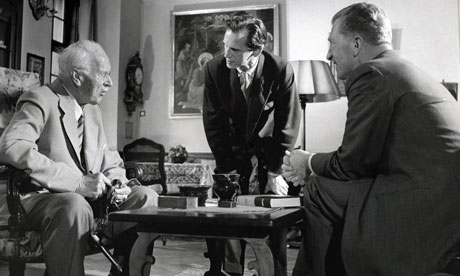The groundbreaking television interview series Face to Face, which ran on the BBC from 1959 to 1962 and gave insights into the thoughts and motivations of the famous, from Lord Hailsham to the pop singer Adam Faith, was the brainchild of the producer Hugh Burnett, who has died aged 87. Burnett based it on his earlier radio series Personal Call and chose the Labour MP turned Panorama presenter John Freeman as the interviewer subjecting those in the firing line to more rigorous questioning than they had experienced in earlier, more deferential days at the BBC.
The programme was distinctive for its black studio background and close-up shots of the interviewees, with Freeman seen only from behind. "Tighter! Tighter!" was the instruction Burnett – who also directed – barked at his camera operators, as he explained in the recent radio documentary Freeman's World. Equally distinctive were the title sequence, featuring caricatures of that week's interviewee drawn by the expressionist painter Feliks Topolski, and the theme music, an excerpt from Hector Berlioz's unfinished opera Les Francs-Juges.
Burnett decided to end the programme after 35 episodes, when Freeman wanted to leave, considering his skilful interviewing to be an essential ingredient. Among the highlights had been the comedian Tony Hancock showing for the first time the flipside to his public persona, voicing self-criticism and self-doubt, eight years before he took his own life.
Although the broadcaster Gilbert Harding appeared emotional on being asked whether he had ever been present at someone's death, with Freeman unaware that his mother had just died, Burnett insisted that he was simply sweating under the studio lights. King Hussein of Jordan, Martin Luther King and Evelyn Waugh also appeared. "Each guest, like an animal in the jungle, made their own personal mark," Burnett recalled in the BBC magazine Prospero in 2009. Years after Burnett left the BBC, Face to Face was revived (from 1989 to 1998) with Jeremy Isaacs in the interviewer's chair, but it could never have the impact that it had enjoyed in those more pioneering days.
Burnett was born in Sheffield, where his father worked as a journalist before moving to St Albans and then London, when his father became editor of the Methodist Recorder. Hugh showed an early interest in journalism, editing his school magazine and cycling, aged 14, to George Bernard Shaw's house in Hertfordshire, where he met the poet and left a list of 30 written questions.
After studying at LSE, he served in the army's Intelligence Corps during the second world war and was assigned to airport security in Assam, India. He briefly worked for the Foreign Office, then joined BBC radio's General Overseas Service (forerunner to the World Service) in 1949 and created Personal Call. The programme featured interviews with personalities in their homes, one of the most notable being John Betjeman, who sang one of his poems with his wife as she strummed a guitar.
In 1955, Burnett switched to BBC television's talks department, where he worked alongside Huw Wheldon, who was happy to let him take over as producer of the agony-aunt series Is This Your Problem?, Wheldon considering it an embarrassing mistake in an otherwise illustrious broadcasting career. Burnett then made a medical series, Lifeline (1957-60).
Later, he produced and directed some episodes of the satirical programme The Late Show (1966-67) and made documentaries such as Warsaw Ghetto (1965), about the Nazis' wartime occupation, and Escape from Sanity (1967), with schizophrenic patients talking of their difficulties.
From 1968 onwards, he produced a string of films in South Africa, many shot under cover – including South Africa Loves Jesus (1971), on the different attitudes of the country's Christian churches to apartheid, and The Colour Line (1971), visiting a blood bank where the blood was labelled according to the donor's race. With an interest in the unexplained, Burnett also made The Ghost Hunters (1975) and The Mystery of Loch Ness (1976), and two programmes about reincarnation, I Have Seen Yesterday (1980) and Spirits from the Past (1980).
Before joining the BBC, he had achieved success as a cartoonist, under the pseudonym Phelix, selling his work to Esquire magazine. Later, he contributed to the New Statesman, Private Eye and the Oldie. Having not been converted to religion by his Methodist parents, he showed his questioning nature in cartoons featuring monks. These are included in his book collections, such as Top Sacred (1960); his work was also shown in the Private Eye 50th anniversary exhibition, which opened in October 2011 at the Victoria and Albert museum, in London.
Burnett married Simone Le Court de Billot in 1951. She and their three sons predeceased him.
• Richard Hugh Burnett, producer and director, born 21 July 1924; died 25 November 2011







